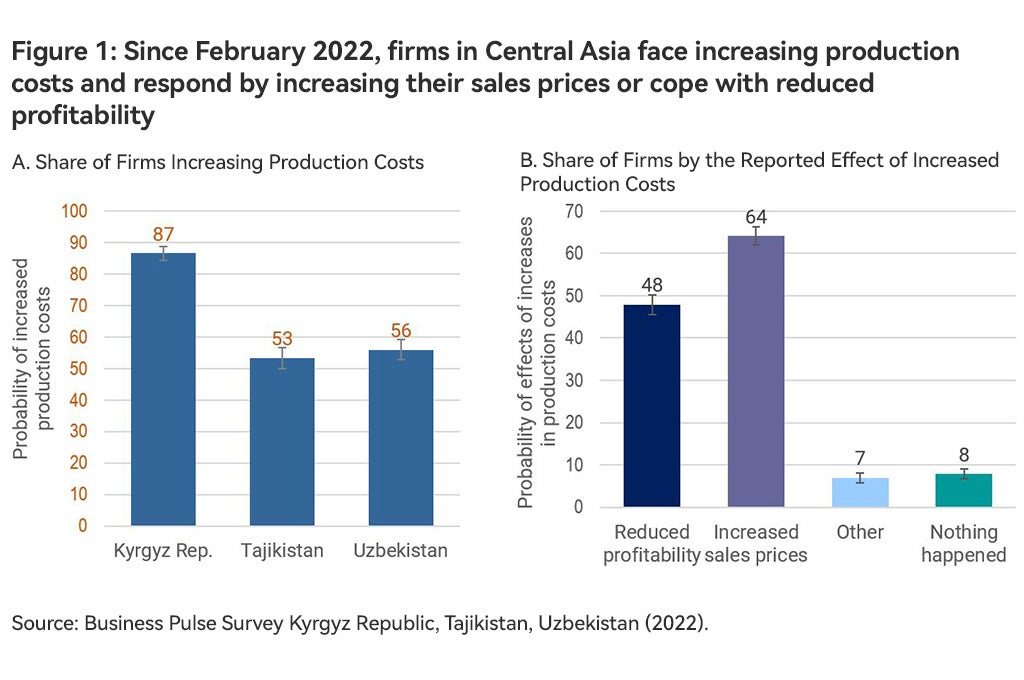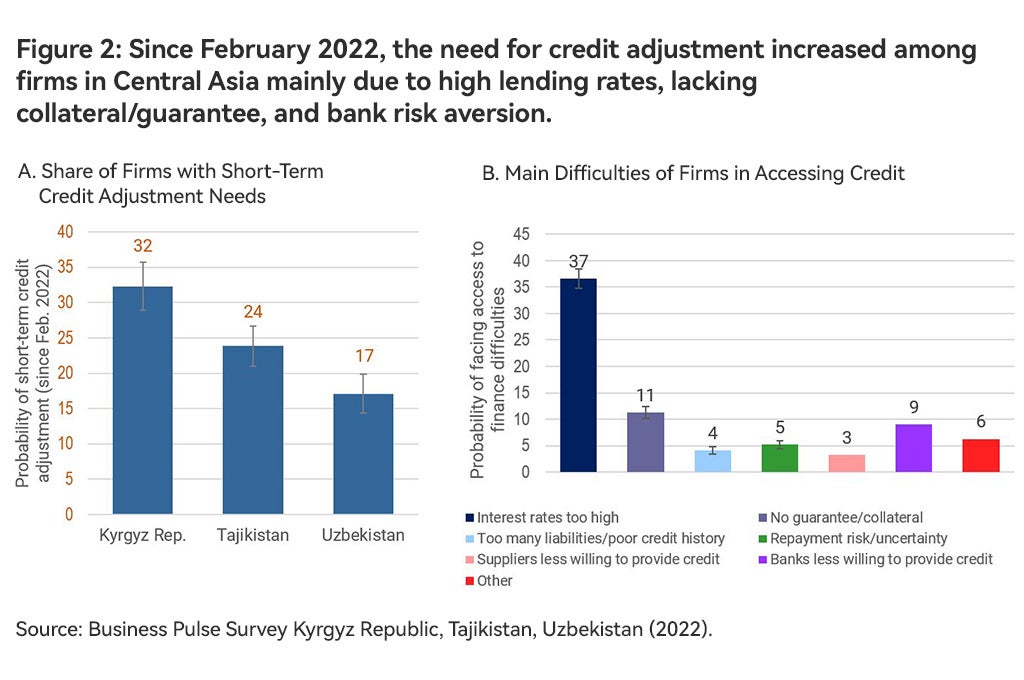 Business Pulse Survey
Business Pulse Survey
Businesses worldwide feel the repercussions of the Russian invasion of Ukraine, but how exactly is the private sector faring in Central Asia—a region with deep trade and investment ties to Russia? Are certain firms struggling more, and in which countries? Answering these questions is critical for governments in responding to the economic shocks caused by the war. A new wave of data from the World Bank’s most recently collected Business Pulse Survey for the Kyrgyz Republic, Tajikistan, and Uzbekistan reveals critical insights on the extent of the war’s likely impact on firms and its variation across countries.
Rising Costs and Prices
Since February 2022, 65% of firms in the three surveyed Central Asian countries report that they face increasing production costs, with such cost increases more widespread among Kyrgyz firms given they source more inputs from Russia (figure 1, panel A). Overall, 43% of surveyed firms indicated that either imports from Russia or Ukraine have decreased or that they have stopped sourcing from these countries altogether. In addition, firms are responding to growing production costs by raising their sales prices or by coping with reduced profitability (figure 1, panel B).

Moreover, firms that sell to exporters or multinationals from Russia or Ukraine experience, on average, a 5% decline in sales (with large variation around this average ranging from around a 3% growth in sales to roughly a 13% drop) while firms not selling to Russia or Ukraine have seen their sales increase by 5% on average.
Access to Credit
Since February 2022, firms in the Kyrgyz Republic, Tajikistan, and Uzbekistan have struggled with increasing financial difficulties, possibly because of reduced profitability and greater difficulty accessing new credit financing. About one-quarter of the surveyed firms were under strain, needing to adjust their credit and decrease their debt burden. Not surprisingly, these credit adjustment needs are most intensely felt by firms in the Kyrgyz Republic, which is the most integrated of the three countries in terms of trade with Russia (figure 2, panel A).
Interestingly, all firms have been facing mounting difficulties in accessing credit regardless of their financial condition (fragility). High interest rates top the list of major difficulties firms confront in accessing credit. The second most commonly cited difficulty on that list is the availability of collateral and guarantees that could help address firms’ increasing credit risk and potentially reduce lending rates. And third is banks’ unwillingness to provide credit—possibly stemming from tightened credit standards and increased risk aversion given higher global uncertainty.

In sum, businesses in the Kyrgyz Republic, Tajikistan, and Uzbekistan are being squeezed by their rising production costs and worsening access to credit. As a result, these firms’ productivity and competitiveness will likely suffer, leading to closures, job losses, and slower economic growth. In response to these challenges, policymakers in these three countries should think about transparent assistance to firms that:
- Helps redirect and diversify away from trade that has been impacted by sanctions on Russia, including by using embassies to identify alternative markets to source from and export to
- Tackles transport and logistical issues as well as overcomes trade payment challenges such as those related to disrupted correspondence banking given sanctions on Russia
- Improves the targeting of financial and non-financial support to businesses to ensure only firms that truly need support receive it and that fiscal resources are not drained unnecessarily
- Ensures that any forbearance and bankruptcy protection are time-bound and transparent, they do not provide “zombie firms” (economically unviable firms with low productivity) with a new lease on life, while easing the entry of new firms into the market
The World Bank has been supporting the Central Asian countries to better respond to this type of external shock. Some of that support comes through credit guarantee schemes to ease micro, small and medium enterprises (MSME) access to finance in the Kyrgyz Republic, Tajikistan, and Uzbekistan, including firms in the agricultural sector. In parallel, World Bank projects in Tajikistan and Kazakhstan, and technical assistance in the Kyrgyz Republic involve supplier development programs to help firms integrate into global value chains, advance their export opportunities, and build resilience.
Timely data is a critical policy tool for countries in the region to understand contemporary business dynamics and better design interventions to support firms and the overall economy. The World Bank is currently undertaking a survey in Kazakhstan, and will continue analyze just in time data to help produce actionable insights for policymakers in Central Asia as they work toward recovery and push ahead on reforms for a more resilient and sustainable future.



Join the Conversation